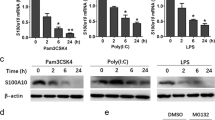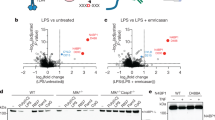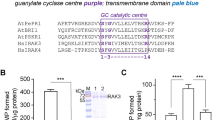Abstract
Apoptosis signal–regulating kinase 1 (ASK1) is an evolutionarily conserved mitogen-activated protein 3-kinase that activates both Jnk and p38 mitogen-activated protein kinases. Here we used ASK1-deficient mice to show that ASK1 was selectively required for lipopolysaccharide-induced activation of p38 but not of Jnk or the transcription factor NF-κB. ASK1 was required for the induction of proinflammatory cytokines dependent on Toll-like receptor 4 (TLR4) but not TLR2 or other TLRs. Consistent with this, ASK1-deficient mice were resistant to lipopolysaccharide-induced septic shock. Lipopolysaccharide induced the production of intracellular reactive oxygen species, which was required for the formation of a complex of the adaptor molecule TRAF6 and ASK1 and subsequent activation of the ASK1-p38 pathway. Our data demonstrate that the reactive oxygen species–dependent TRAF6-ASK1-p38 axis is crucial for TLR4-mediated mammalian innate immunity.
This is a preview of subscription content, access via your institution
Access options
Subscribe to this journal
Receive 12 print issues and online access
$209.00 per year
only $17.42 per issue
Buy this article
- Purchase on Springer Link
- Instant access to full article PDF
Prices may be subject to local taxes which are calculated during checkout






Similar content being viewed by others
References
Medzhitov, R. Toll-like receptors and innate immunity. Nat. Rev. Immunol. 1, 135–145 (2001).
Akira, S., Takeda, K. & Kaisho, T. Toll-like receptors: critical proteins linking innate and acquired immunity. Nat. Immunol. 2, 675–680 (2001).
Hoffmann, J.A. & Reichhart, J.M. Drosophila innate immunity: an evolutionary perspective. Nat. Immunol. 3, 121–126 (2002).
Vidal, S. et al. Mutations in the Drosophila dTAK1 gene reveal a conserved function for MAPKKKs in the control of rel/NF-κB-dependent innate immune responses. Genes Dev. 15, 1900–1912 (2001).
Senftleben, U., Li, Z.W., Baud, V. & Karin, M. IKKβ is essential for protecting T cells from TNFα-induced apoptosis. Immunity 14, 217–230 (2001).
Alcamo, E. et al. Targeted mutation of TNF receptor I rescues the RelA-deficient mouse and reveals a critical role for NF-κB in leukocyte recruitment. J. Immunol. 167, 1592–1600 (2001).
Kim, D.H. et al. A conserved p38 MAP kinase pathway in Caenorhabditis elegans innate immunity. Science 297, 623–626 (2002).
Ichijo, H. et al. Induction of apoptosis by ASK1, a mammalian MAPKKK that activates SAPK/JNK and p38 signaling pathways. Science 275, 90–94 (1997).
Nishitoh, H. et al. ASK1 is essential for endoplasmic reticulum stress-induced neuronal cell death triggered by expanded polyglutamine repeats. Genes Dev. 16, 1345–1355 (2002).
Tobiume, K. et al. ASK1 is required for sustained activations of JNK/p38 MAP kinases and apoptosis. EMBO Rep. 2, 222–228 (2001).
Mochida, Y. et al. ASK1 inhibits interleukin-1-induced NF-κB activity through disruption of TRAF6–TAK1 interaction. J. Biol. Chem. 275, 32747–32752 (2000).
Kawai, T., Adachi, O., Ogawa, T., Takeda, K. & Akira, S. Unresponsiveness of MyD88-deficient mice to endotoxin. Immunity 11, 115–122 (1999).
Yamamoto, M. et al. Essential role for TIRAP in activation of the signalling cascade shared by TLR2 and TLR4. Nature 420, 324–329 (2002).
Horng, T., Barton, G.M., Flavell, R.A. & Medzhitov, R. The adaptor molecule TIRAP provides signalling specificity for Toll-like receptors. Nature 420, 329–333 (2002).
Swantek, J.L., Tsen, F.M., Cobb, H.M. & Thomas, A.J. IL-1 receptor-associated kinase modulates host responsiveness to endotoxin. J. Immunol. 164, 4301–4306 (2000).
Suzuki, N. et al. Severe impairment of interleukin-1 and Toll-like receptor signalling in mice lacking IRAK-4. Nature 416, 750–756 (2002).
Lomaga, M.A. et al. TRAF6 deficiency results in osteopetrosis and defective interleukin-1, CD40, and LPS signaling. Genes Dev. 13, 1015–1024 (1999).
Chin, A.I. et al. Involvement of receptor-interacting protein 2 in innate and adaptive immune responses. Nature 416, 190–194 (2002).
Kobayashi, K. et al. RICK/Rip2/CARDIAK mediates signalling for receptors of the innate and adaptive immune systems. Nature 416, 194–199 (2002).
Tobiume, K., Saitoh, M. & Ichijo, H. Activation of apoptosis signal-regulating kinase 1 by the stress-induced activating phosphorylation of pre-formed oligomer. J. Cell. Physiol. 191, 95–104 (2002).
Inaba, K. et al. Generation of large numbers of dendritic cells from mouse bone marrow cultures supplemented with granulocyte/macrophage colony-stimulating factor. J. Exp. Med. 176, 1693–1702 (1992).
Morelli, A.E. et al. Recombinant adenovirus induces maturation of dendritic cells via an NF-κB-dependent pathway. J. Virol. 74, 9617–9628 (2000).
Rousseau, S. et al. Inhibition of SAPK2a/p38 prevents hnRNP A0 phosphorylation by MAPKAP-K2 and its interaction with cytokine mRNAs. EMBO J. 21, 6505–6514 (2002).
Frevel, M.A. et al. p38 Mitogen-activated protein kinase-dependent and -independent signaling of mRNA stability of AU-rich element-containing transcripts. Mol. Cell. Biol. 23, 425–436 (2003).
Hsu, H.Y. & Wen, M.H. Lipopolysaccharide-mediated reactive oxygen species and signal transduction in the regulation of interleukin-1 gene expression. J. Biol. Chem. 277, 22131–22139 (2002).
Nishitoh, H. et al. ASK1 is essential for JNK/SAPK activation by TRAF2. Mol. Cell 2, 389–395 (1998).
Park, H.S. et al. Direct interaction of TLR4 with NAD(P)H oxidase 4 isozyme is essential for lipopolysaccharide-induced production of reactive oxygen species and activation of NF-κB. J. Immunol. 173, 3589–3593 (2004).
Liu, H., Nishitoh, H., Ichijo, H. & Kyriakis, J.M. Activation of apoptosis signal-regulating kinase 1 (ASK1) by tumor necrosis factor receptor-associated factor 2 requires prior dissociation of the ASK1 inhibitor thioredoxin. Mol. Cell. Biol. 20, 2198–2208 (2000).
Saitoh, M. et al. Mammalian thioredoxin is a direct inhibitor of apoptosis signal-regulating kinase (ASK) 1. EMBO J. 17, 2596–2606 (1998).
Gohda, J., Matsumura, T. & Inoue, J. TNFR-associated factor (TRAF) 6 is essential for MyD88-dependent pathway but not Toll/IL-1 receptor domain-containing adaptor-inducing IFN-β (TRIF)-dependent pathway in TLR signaling. J. Immunol. 173, 2913–2917 (2004).
Riedemann, N.C., Guo, R.F. & Ward, P.A. Novel strategies for the treatment of sepsis. Nat. Med. 9, 517–524 (2003).
Yamamoto, M. et al. Role of adaptor TRIF in the MyD88-independent toll-like receptor signaling pathway. Science 301, 640–643 (2003).
Kawai, T. et al. Lipopolysaccharide stimulates the MyD88-independent pathway and results in activation of IFN-regulatory factor 3 and the expression of a subset of lipopolysaccharide-inducible genes. J. Immunol. 167, 5887–5894 (2001).
Kobayashi, T. et al. TRAF6 is a critical factor for dendritic cell maturation and development. Immunity 19, 353–363 (2003).
Setsukinai, K., Urano, Y., Kakinuma, K., Majima, H.J. & Nagano, T. Development of novel fluorescence probes that can reliably detect reactive oxygen species and distinguish specific species. J. Biol. Chem. 278, 3170–3175 (2003).
Acknowledgements
We thank M. Karin and T. Taga for comments, and all the members of Laboratory of Cell Signaling. Supported by Grants-in-Aid for scientific research from the Ministry of Education, Culture, Sports, Science and Technology of Japan and Core Research for Evolutional Science and Technology, Japan Science and Technology Corporation.
Author information
Authors and Affiliations
Corresponding author
Ethics declarations
Competing interests
The authors declare no competing financial interests.
Supplementary information
Supplementary Fig. 1
LPS-induced expression of inducible NO synthase (iNOS) is reduced in ASK1-deficient DCs. (PDF 70 kb)
Supplementary Fig. 2
Normal expression of TLR4–MD-2 in ASK1-deficient cells and inhibitory effects of p38 inhibitor on LPS-induced cytokine productions. (PDF 110 kb)
Supplementary Fig. 3
PGN-induced IL-6 production in ASK1-deficient splenocytes and inability of poly(I:C) and CpG on ASK1 activation. (PDF 312 kb)
Supplementary Fig. 4
ASK1 is not essential for TLR2-dependent pathway. (PDF 199 kb)
Supplementary Fig. 5
ROS-dependent endogenous interaction between TRAF6 and ASK1 induced by LPS. (PDF 199 kb)
Supplementary Fig. 6
Specificity of TRAF6 antibody (PDF 142 kb)
Rights and permissions
About this article
Cite this article
Matsuzawa, A., Saegusa, K., Noguchi, T. et al. ROS-dependent activation of the TRAF6-ASK1-p38 pathway is selectively required for TLR4-mediated innate immunity. Nat Immunol 6, 587–592 (2005). https://doi.org/10.1038/ni1200
Received:
Accepted:
Published:
Issue Date:
DOI: https://doi.org/10.1038/ni1200
This article is cited by
-
Selenium Deficiency Causes Iron Death and Inflammatory Injury Through Oxidative Stress in the Mice Gastric Mucosa
Biological Trace Element Research (2024)
-
Nitric oxide-induced ribosome collision activates ribosomal surveillance mechanisms
Cell Death & Disease (2023)
-
Methacrylic Acid-Based Regenerative Biomaterials: Explorations into the MAAgic
Regenerative Engineering and Translational Medicine (2023)
-
Prospect of thioredoxin as a possibly effective tool to combat OSAHS
Sleep and Breathing (2023)
-
Harnessing rat derived model cells to assess the toxicity of TiO2 nanoparticles
Journal of Materials Science: Materials in Medicine (2022)



